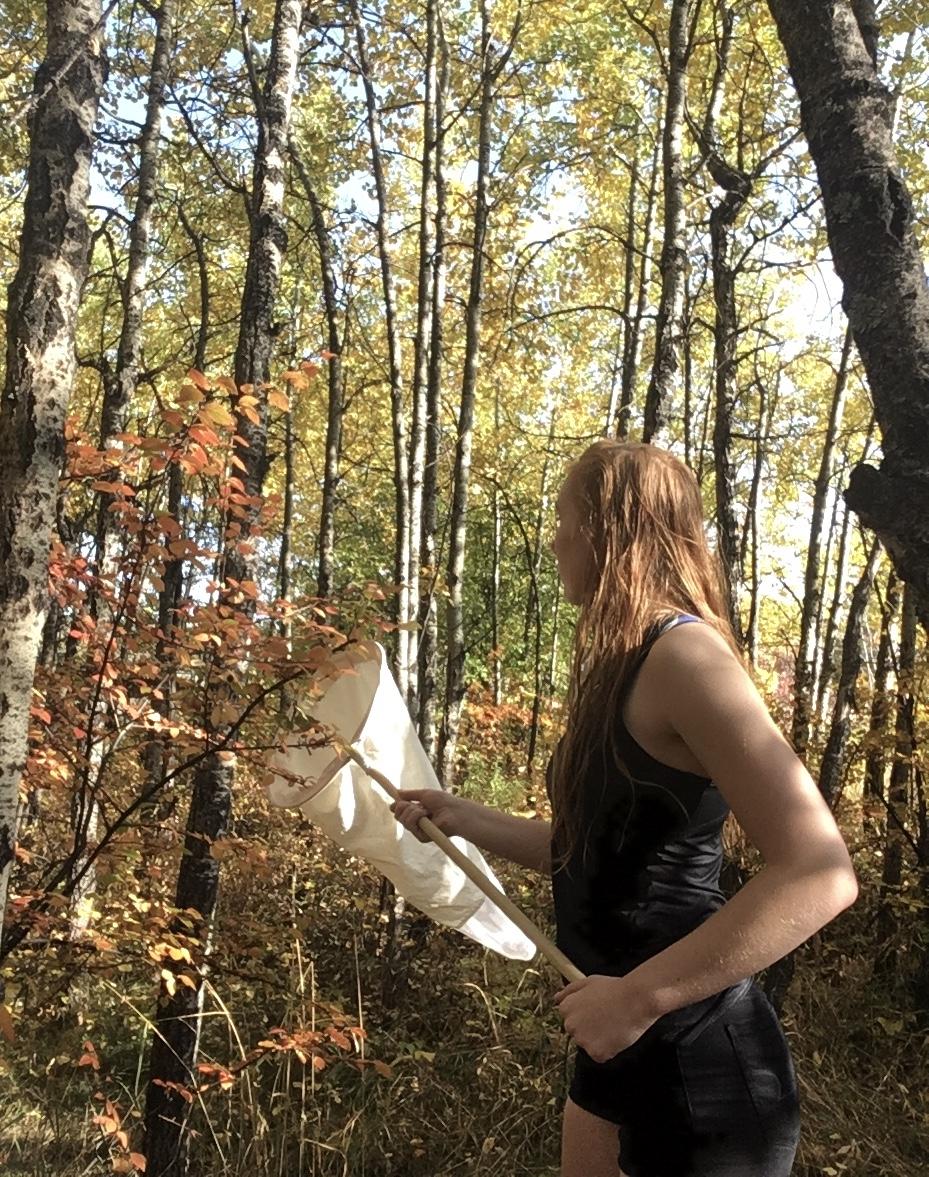April 19, 2022
All abuzz about bees at University of Calgary 'Bee Campus'

When studying science at the University of Calgary, it’s a mark of distinction to get a “bee” — the more bees, the better.
UCalgary is a designated Bee Campus, where students, faculty and staff research and promote pollinator, invertebrate and plant biodiversity on campus and in the broader community.
“We officially became a Bee Campus in early 2020,” says Dr. Mindi Summers, PhD, a senior instructor in ecology and evolutionary biology in the Department of Biological Sciences in the Faculty of Science.
The designation was awarded by Bee City Canada, a charitable organization whose mission is to inspire cities, towns, First Nations, schools, businesses and other organizations to take actions to protect bees and other pollinators.
UCalgary’s Bee Campus activities are led by a collaboration between the Department of Biological Sciences and the Office of Sustainability, and involves researchers at the Schulich School of Engineering and specialists at the Taylor Family Digital Library, Summers says.
Bee Campus encompasses research by faculty in Biological Sciences to understand bees and other beneficial insects and promote conservation and protection of pollinators’ habitat on urban and agricultural landscapes — including planting bee-supporting native plants on campus.
A key activity is producing a digital reference collection of photos of the native bees of Alberta, along with other invertebrates. “There are over 330 different species of native bees just in Alberta alone,” Summers says.

Kirstin Young
Experiential learning a key part of Bee Campus
A vital aspect of UCalgary’s Bee Campus is providing undergraduate students with opportunities to do hands-on, real-world research on bees and other pollinators and insects.
While many students have faced computer screens during the last two years, students who took Summers’s Zoology 435 course in entomology were out in backyards, Calgary parks and the Rocky Mountains looking for anything with six legs and wings.
The students collected and curated their own insect collection in Calgary and the surrounding areas, to catalogue biodiversity for The City of Calgary. They also contributed more than 3,300 insect observations to an online global repository and community, called iNaturalist, for identifying species.
The activities formed part of a course-based undergraduate research experience (CURE), one of two pilot CURE courses supported by the College of Discovery, Creativity and Innovation, an arm of the Taylor Institute for Teaching and Learning.
The CURE initiative expands undergraduate research opportunities by integrating hands-on experiential learning into existing courses.
To encourage creativity and give students more choice in how to advance their research, Summers invited her students to produce a series of science communications pieces on why people should care about insect biodiversity.
“CURE students have taken initiative with their research and gained confidence in their abilities to work independently,” Summers says.
Kirstin Young says like many people, she didn’t really enjoy bugs when she took Summers’s zoology course.
“Having a learner-centred course with freedom in the presentation of materials allowed me to find a passion in a topic that many people wouldn’t think to look, and to take this passion and share it with others,” she says.
As a Girl Guides leader, she used what she learned to create a lesson plan for Girl Guides. “I had girls of all ages asking questions and learning about bugs they had previously considered ‘gross and scary,’” says Young, who graduated last year with a BSc in Biological Sciences and a major in zoology.
Emily Hall
Engaging with the community
Another UCalgary Bee Campus-led activity is the Calgary Pollinator Count Community Science Project, launched last summer by Summers and a couple of her students.
Pollinators help to produce one-fifth to one-third of the food on our plates, Summers notes. Native bees and other pollinators are essential for pollinating native plants, along with flowering plants in parks and gardens.
Scientists know some plants support a greater diversity of pollinators and some pollinators require specific plants, but not about these aspects in Calgary, Summers says.
“One of the important reasons why we’re doing the Calgary Pollinator Count now is we don’t have the baseline data for Calgary to actually be able to answer some important questions,” she adds.
During the annual Pollinator Week celebration (June 20 to 26 this year), all Calgary residents and citizen scientists are invited to participate in the Calgary Pollinator Count by taking photos of bees and other pollinators in back yards, gardens, parks and natural areas.
Michaela Seal, a former student of Summers involved in the Calgary Pollinator Count, says: “I would encourage anyone to participate, as it’s a meaningful way of helping improve our understanding of pollinators and take pride in the biodiversity our city hosts.” Seal graduated last year with a BSc in Biological Sciences and a major in zoology.
Along with native bees, butterflies and moths, often-overlooked important pollinators include flies and wasps, along with insects that stop on flowers and “accidentally” perform pollination, such as true bugs, beetles, dragonflies and grasshoppers.
To spread the word about all the insect pollinators important to biodiversity, the Department of Biological Sciences has partnered with UCalgary’s drama program and Wagonstage Theatre.
Wagonstage goes to local community parks and associations throughout the summer and presents a play for children and their families.
This summer’s play, titled Bee Betrayal, is about pollinators, including “wanna-bees” — insects that mimic the pattern and colour of bees, such as flower flies or hover flies.
With University of Calgary Giving Day until April 21, donors’ gifts “will enable support for all of these different Bee Campus activities, with a real focus on funding undergraduate student research and outreach opportunities,” Summers says.
This Giving Day, make an impact with your gift and help our researchers preserve local biodiversity and develop training tools and resources for community/citizen science initiatives.








